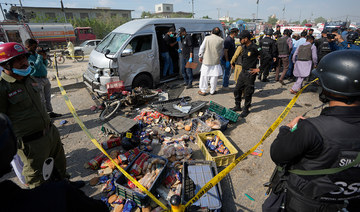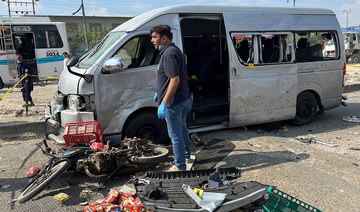MULTAN, Pakistan: A raging fire swept through a train in Pakistan’s eastern Punjab Province on Thursday, killing 74 people, and survivors said afterward it took nearly 20 minutes for the train to stop amid contradictory reports about the condition of the train’s brakes.
Three carriages were consumed by flames from a fire caused by a cooking gas stove and dozens of people jumped in panic from the speeding train.
Conductor Sadiue Ahmed Khan told The Associated Press the train’s emergency breaking system was in perfect working order and the train stopped within three minutes after the first signs of fire.
“This is the worst tragedy in my life as a driver,” he said.
Investigators said they will be looking at the train’s braking system to determine its condition at the time of the fire. Survivors recounted pulling at emergency cords that weave through the train to notify the conductor, but they said the train continued to speed down the tracks.
Ghulam Abbas, a passenger who had gotten on the train in the town of Nawabshah in neighboring Sindh Province with his wife and two children, echoed other passengers who said it took nearly 20 minutes for the train to stop. He recousnted watching panicked passengers jumping off the speeding locomotive.
“We learned afterward that most of them had died,” he said.
Abbas’ wife, Sulai Khan Bibi, said she was horrified what would happen to their two small children. “We were so close to death, but Allah saved us,” she said, clutching the children.
The train, which was traveling from the southern Arabian Sea port city of Karachi to Rawalpindi, just 10 kilometers (6 miles) from the federal capital, was carrying 857 passengers. Most of the dead were members of Tableeqi-e-Jamaat, an organization of Islamic missionaries. The fire was believed to have started in their compartment.
Mufti Wahab, a district chief of the Tableeqi-e-Jamaat, said as many as 52 members of his organization were “martyred because of the fire.”
The fire apparently started after one of several small stoves brought on to the train by the the Tableeqi members exploded, setting other gas cylinders used to fuel the stoves on fire, said Deputy Railways Commissioner Jamil Ahmed.
Flames roared through the train engulfing three carriages as it approached the town of Liaquatpur in Punjab. Survivors recounted horrific scenes of fellow passengers screaming as they jumped through windows and off the train, flames billowing from the carriages.
“We could hear people crying and screaming for help,” said Chaudhry Shujaat, who had boarded the train just a few hours earlier with his wife and two children. “I thought we would die. The next car was on fire. We felt so helpless.”
Kaleem Ullah, an official with the district emergency services, said of the 43 people injured, 11 were still in critical condition. Several of them had jumped off the train — many to their deaths — after the fire broke out and before it eventually screeched to a halt, said Ahmed, the railways official.
In Pakistan, poor passengers often bring their own small gas stoves on the trains to cook their meals, despite rules to the contrary, according to Railways Minister Sheikh Rashid Ahmed. Safety regulations are often ignored in the overcrowded trains.
Railway official Shabir Ahmed said bodies of passengers were scattered over a 2 kilometer- (1 mile-) wide area around the site.
People from nearby villages rushed to the train, carrying buckets of water and shovels to help douse the flames. “But it was impossible,” said Ahmed.
Through the morning hours, rescue workers and inspectors sifted through the charred wreckage, looking for survivors and aiding the injured. Local Pakistani TV footage from the scene showed a huge blaze raging as firefighters struggled to get it under control.
Officials said they were still trying to identify the victims and that the lists of fatalities and those injured were not ready yet. Another train was dispatched to bring the survivors to the city of Rawalpindi, they said.
Yasmin Rashid, a provincial minister in Punjab, told reporters that medical staff were providing the best possible treatment for the injured at a hospital in Liaquatpur. Those critically injured were taken by ambulance to the city of Multan, the largest city nearest to the site of the accident.
Pakistan’s military said troops were also participating in the rescue operation. President Arif Alvi and Prime Minister Imran Khan issued statements expressing their sorrow over the tragedy.
Khan took to Twitter to offer his condolences to the families of those killed and say he was praying for the speedy recovery of the injured. He also ordered an urgent investigation into the incident.
UN Secretary-General also extended “deep condolences” to the families of the victims as well as the people and government of Pakistan and wished “a swift and full recovery to those who were injured,” UN spokesman Stephane Dujarric said.
Train accidents in Pakistan are often the result of poor railway infrastructure and official negligence. Media reports on Thursday suggest that railways officials did not notice when passengers boarded the train, carrying individual gas stoves.
In July, a passenger train rammed into a freight train at the Walhar Railway Station in the district of Rahim Yar Khan, killing at least 20 people and injuring 74.
A month earlier, a passenger train traveling to the eastern city of Lahore from the port city of Karachi collided with a freight train in the southern city of Hyderabad, killing three people.
Survivors say burning train took 20 minutes to stop, 74 dead
Survivors say burning train took 20 minutes to stop, 74 dead
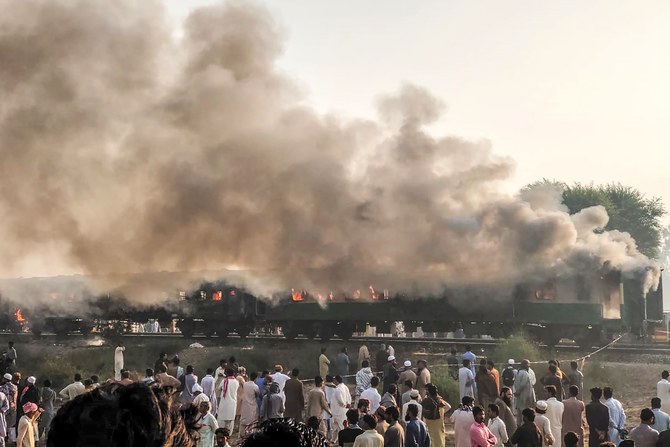
- The train which was traveling from Karachi to Rawalpindi was carrying 857 passengers
- PM Khan ordered an urgent investigation into the incident
Police say attack on Japanese nationals in Karachi can be a case of ‘mistaken identity’
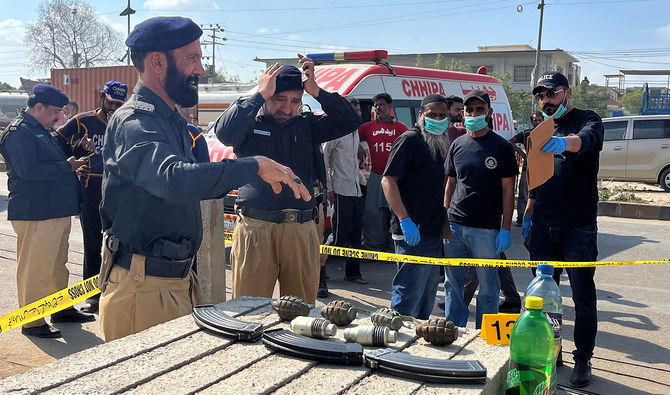
- In the past, Baloch separatists have claimed responsibility for attacks on Chinese nationals in the Pakistani port city
- However, Friday’s suicide attack on a van was the first incident in Pakistan that appeared to target Japanese nationals
KARACHI: The suicide attack on Japanese nationals in Pakistan’s southern city of Karachi could be a case of “mistaken identity” as no group has claimed responsibility for it, a senior police officer said on Saturday.
The Japanese nationals were traveling on Friday in a Hiace van to an industrial area, where they worked at Pak Suzuki Motors, when the suicide bomber detonated his explosive-laden vest near the van, according to police.
A police team escorting the vehicle returned fire after coming under attack, killing an accomplice of the suicide bomber. Officials said one of the attackers was identified as Sohail Ahmed, a resident of Panjgur district in the southwestern Balochistan province.
However, Ghulam Nabi Memon, the provincial police chief, said no militant group had accepted responsibility for the attack and it seemed they didn’t intend to attack the Japanese.
“For now, it seems to us to be a case of mistaken identity,” Memon told Arab News. “We are reviewing security protocols. The police and intelligence agencies are making efforts [to arrest the perpetrators].”
In the past, Baloch separatists have claimed responsibility for attacks on Chinese nationals in the Pakistani port city. However, this is the first time that the Japanese have come under such an attack.
A police officer, who spoke on the condition of anonymity, told Arab News that police suspected the attack was carried out by the outlawed Balochistan Liberation Army (BLA). The group has claimed several attacks, including the ones on the Chinese consulate in Karachi, Karachi Stock Exchange, and a suicide attack on Chinese teachers at Karachi University.
A BLA spokesperson didn’t respond to Arab News request for a comment on the attack.
Hours after the attack, Baloch activists shared videos on X, claiming raids were conducted on the homes of their supporters in Karachi.
A police officer, who requested anonymity, confirmed that raids were made to arrest the perpetrators and facilitators of the incident, but declined to share if any arrests were made.
“All I can share is that we are going in the right direction and an important breakthrough will be made soon,” he said.
On Friday, a police handout said the provincial police chief had chaired a high-level meeting, wherein he emphasized the need to establish a dedicated unit for the protection of Chinese nationals.
The police chief also stressed strict implementation of the standard operation procedures (SOPs) regarding the security of foreign delegates and regular issuance of security adviseries by authorities.
“Further discussions centered on enhancing security measures for all Chinese residents, experts, staff, and other foreign guests/delegates in Sindh,” the handout read.
In recent weeks, militants have targeted Chinese nationals working in Pakistan on projects relating to the China-Pakistan Economic Corridor (CPEC), a major segment of Beijing’s Belt and Road infrastructure initiative, which will connect China to the Arabian Sea and help Islamabad expand and modernize its economy through a network of roads, railways, pipelines and ports in Pakistan.
In March, five Chinese nationals and their Pakistani driver were killed in northwest Pakistan, when a suicide bomber rammed his explosive-laden car into the bus carrying them to Dasu Dam, the biggest hydropower project in Pakistan, where they worked.
Saudi cadet bags gold medal as fresh batch graduates from Pakistan Military Academy
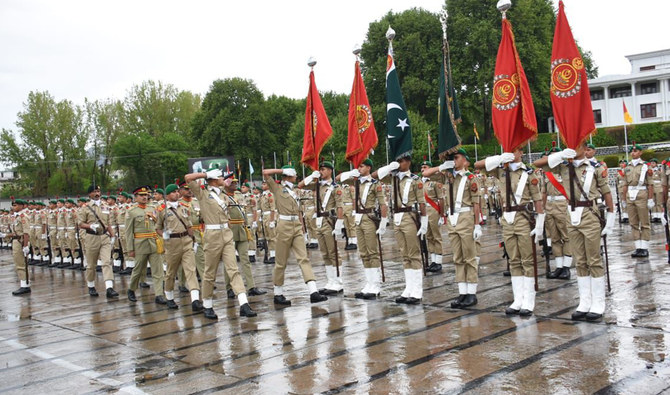
- Forty-nine cadets from “friendly countries” graduate from Pakistan Military Academy in Kakul, says army
- The PMA provides initial training to Pakistani cadets and recruits from friendly countries such as Saudi Arabia
ISLAMABAD: The Pakistan Army awarded the Chairman Joint Chiefs of Staff Committee Overseas Gold Medal to a Saudi cadet in recognition of his performance, as a fresh batch of local and international cadets graduated from the Pakistan Military Academy (PMA) on Saturday, the army’s media wing said.
General Sahir Shamshad Mirza, chairman joint chiefs of staff committee, was the chief guest at the passing out parade of the 149th PMA Long Course at the academy in Kakul. General Metin Gürak, the chief of the Turkish general staff who is on an official visit to Pakistan, was the guest of honor at the ceremony.
Gen. Mirza reviewed and spoke to cadets at the parade while General Gürak presented the awards to the distinguished cadets, the Inter-Services Public Relations (ISPR) said.
“The Chairman Joint Chiefs of Staff Committee Overseas Gold Medal was awarded to Friendly Country Senior Under Officer Fahad Bin Aqil Al Towarqi Al Fallaj from Kingdom of Saudi Arabia,” the ISPR said.
The army’s media wing said 49 cadets from “friendly countries” also graduated at the ceremony. The coveted Sword of Honour was awarded to Academy Senior Under Officer Muhammad Nauman Abdullah.
The President’s Gold medal was awarded to Company Senior Under Officer Muhammad Abdullah Javed of the 149th PMA Long Course, the army’s media wing said.
“Since its inception, PMA has remained the cradle of leadership and center of excellence for cadets joining the premier institution of Army,” Gen. Mirza was quoted as saying by the ISPR.
“Over the years, PMA has also trained scores of foreign cadets whose brilliant performance in their respective Armies stands testament to the professional ethos of PMA.”
The PMA in Kakul, Abbottabad, provides initial training to Pakistan Army cadets and recruits from friendly countries, including Saudi Arabia, the Middle East and elsewhere in the world.
Pakistan and Saudi Arabia enjoy fraternal relations, leading the two countries to cooperate in trade, defense and other vital sectors.
The Kingdom is home to over 2.7 million Pakistani expatriates and serves as the cash-strapped South Asian country’s largest source of remittances.
Pakistan to hold by-elections on 21 national, provincial assembly seats on Sunday
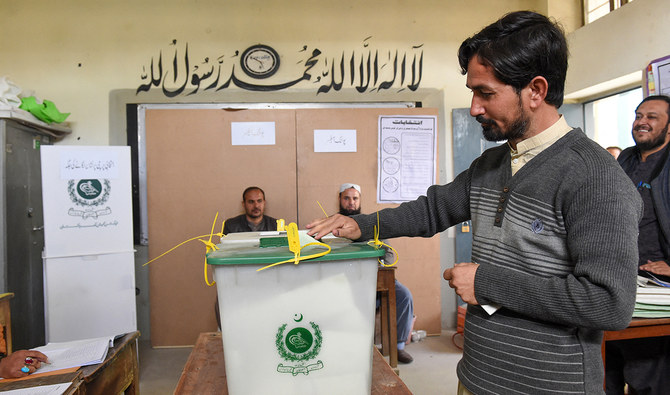
- Polling will be held on seats vacated by candidates or where polling was postponed due to various reasons
- Polling will take place on seats vacated by PM Shehbaz Sharif, Chief Ministers Maryam Nawaz and Ali Amin Gandapur
ISLAMABAD: Pakistan will conduct by-elections on 21 national and provincial seats on Sunday, state-run media reported on Saturday, marking the country’s first major electoral exercise since the contentious general elections of Feb. 8.
The by-elections would be held on the national and provincial assembly seats that were vacated by candidates following the Feb. 8 elections.
Polling on Sunday is scheduled to be held on five National Assembly seats, 12 Punjab Assembly seats, two Khyber Pakhtunkhwa (KP) Assembly seats and two Balochistan Assembly seats.
“Polling will start at 8:00 in the morning and it will continue till 5:00 p.m. without any break,” Radio Pakistan said.
Polling for NA-8 Bajaur and PK-22 Bajaur were postponed on Feb. 8 after the murder of a candidate, Rehan Zeb Khan. Polling will also be held in NA-44 Dera Ismail Khan, where the National Assembly seat was vacated by Ali Amin Gandapur, who retained his provisional assembly seat to become KP’s chief minister.
Similarly, Punjab Chief Minister Maryam Nawaz Sharif vacated her NA-119 seat in Pakistan’s eastern city of Lahore, choosing instead to keep the PP-159 constituency that she also won.
Prime Minister Shehbaz Sharif won elections on two provincial and National Assembly seats. He left the NA-132 Kasur and Lahore’s PP-158 and PP-164 seats vacant, preferring to retain the NA-123 Lahore constituency.
Pakistan Peoples Party (PPP) Chairman Bilawal Bhutto-Zardari won two National Assembly seats. He retained the NA-194 Larkana constituency, leaving the NA-196 seat in Qamber Shahdadkot vacant.
Pakistan’s Feb. 8 elections were marred by delayed results, a countrywide shutdown of mobile phone services and rigging allegations. Jailed former prime minister Imran Khan’s Pakistan Tehreek-e-Insaf (PTI) accused Pakistan’s election regulator of manipulating the results of the elections, claiming in reality it had won over 180 National Assembly seats.
The Election Commission of Pakistan (ECP) rejected the PTI’s allegations, saying polling results were delayed due to the shutdown of mobile phone services countrywide. Pakistan’s caretaker administration had said the mobile services were suspended due to security reasons, rejecting rigging allegations by Khan’s party.
Independent candidates backed by Khan secured the highest number of seats in the National Assembly. However, the Pakistan Muslim League-Nawaz (PML-N) emerged as the largest party in the National Assembly, as a court decision prevented Khan-backed candidates from contesting polls with the PTI’s symbol.
Death toll from heavy rains in northwestern Pakistan rises to 46
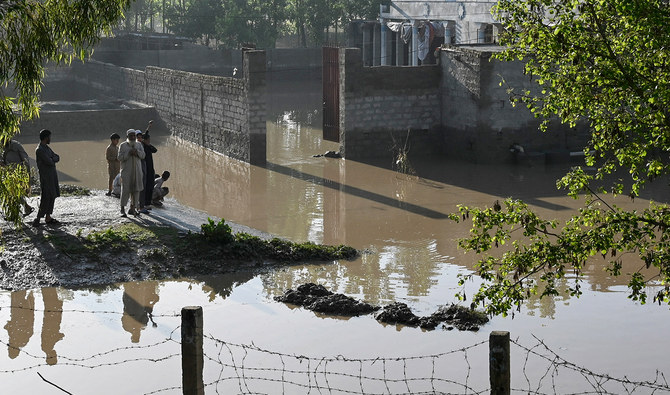
- Forty-six casualties include 25 children, 12 men and nine women, says Provincial Disaster Management Authority
- Heavy rains and lightning strikes have killed at least 36 people in Pakistan’s Punjab and Balochistan provinces since April 12
Peshawar: The death toll from rain-related incidents in northwestern Pakistan rose to 46 on Saturday, the Provincial Disaster Management Authority (PDMA) said on Saturday, while the number of injured climbed to 60.
“As many as 25 children, 12 men and nine women are among those who died in rain-related incidents during the last eight days,” the report said about heavy rains that began in the province last Friday, April 12.
The number of injured has risen to 60, which includes 33 men, 16 children and 11 women, the PDMA said.
The current spell of showers is likely to continue till April 21, the PDMA said this week. The provincial government has released Rs110 million to be distributed among the affected families and dispatched aid, including tents, kitchen kits, blankets, hygiene kits, mosquito nets and mattresses, to the affected areas, according to the authority.
As the rains are expected to continue intermittently until April 21, the PDMA said it had already a letter to all district administrations to remain alert and take precautionary measures.
In the southwestern Balochistan province, heavy rains have killed 15 people since Friday and triggered flash floods in several areas, according to provincial authorities.
Balochistan Chief Minister Sarfaraz Bugti said climate change had become a “challenge” for the provincial government.
“Current rains are unusual which were never reported in a thousand years,” he told reporters on Friday. “The government has been helping the masses with available resources and our teams have reached all districts to help the people affected by rains and floods.”
Pakistan has received heavy rains in the last three weeks that have triggered landslides and flash floods in several parts of the South Asian country.
The eastern province of Punjab has reported 21 lighting- and roof collapse-related deaths, while Balochistan, in the country’s southwest, reported 10 deaths as authorities declared a state of emergency following flash floods.
In 2022, downpours swelled rivers and at one point flooded a third of Pakistan, killing 1,739 people. The floods also caused $30 billion in damages, from which Pakistan is still trying to rebuild.
Pakistan rejects US move to sanction firms for aiding its ballistic missile program
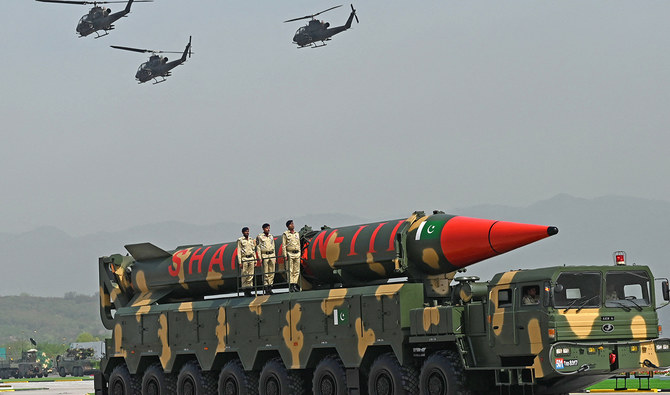
- US sanctions four international companies for supplying missile-applicable items to Pakistan’s ballistic missile program
- Pakistan’s foreign office questions double standards of allowing advanced military technologies to some countries
ISLAMABAD: Pakistan’s foreign office spokesperson on Saturday rejected Washington’s move to impose sanctions on four international firms for providing missile-applicable items to its ballistic missile program, saying Islamabad is against the “political use” of export controls.
In a press release issued late Friday, the US State Department announced sanctions against three Chinese companies and one Belarus-based firm on charges they supplied items to Pakistan’s ballistic missile program.
The companies listed by the US for sanctions are the China-based Xi’an Longde Technology Development Company Limited, Tianjin Creative Source International Trade Co. Ltd, Granpect Company Limited and Belarus-based Minsk Wheel Tractor Plant.
Pakistan’s foreign office spokesperson responded by saying that commercial entities have been sanctioned in the past on allegations of having links to Pakistan’s ballistic missile program “without sharing any evidence whatsoever.”
“Pakistan rejects political use of export controls,” the foreign office spokesperson said in a statement. It added that the same jurisdictions that claim to exercise non-proliferation controls have waived off licensing requirements for advanced military technologies for some countries.
“This is leading to arms build up; accentuating regional asymmetries, and undermining the objectives of non-proliferation and of regional and global peace and security,” it said.
The statement said Islamabad had repeatedly pointed out that such items have legitimate civil commercial uses, urging Washington to avoid “arbitrary application of export controls.”
“There is need for discussions between concerned parties for an objective mechanism to ensure access to technology in pursuit of socio-economic development,” the spokesperson said.
“Pakistan has always been ready to discuss end-use and end-user verification mechanisms so that legitimate commercial users are not hurt by discriminatory application of export controls.”
The sanctions mean all property and interests in property of the companies in the US or in possession or control of American citizens are blocked and must be reported to the US Treasury Department’s Office of Foreign Assets Control (OFAC), the State Department has said.
They also mean that all transactions by American citizens, or those within (or transiting) the US that involve any property or interests in property of the companies, are prohibited unless authorized by a general or specific license issued by OFAC.



